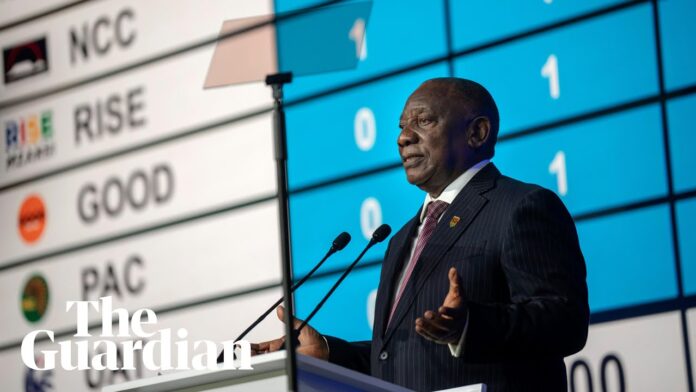Coalition talks intensify as the ANC, having lost its parliamentary majority, navigates potential alliances with DA, EFF, or MK parties
The African National Congress (ANC) stands at a crossroads following a significant electoral defeat, which saw it lose its parliamentary majority for the first time in South Africa’s post-apartheid history. With only 40% of the vote, the ANC must now find a coalition partner to secure a majority in parliament to support its choice of president or attempt to govern with a minority government.
One potential partner is the Democratic Alliance (DA), which won 22% of the vote. However, aligning with the centre-right DA poses political risks. Critics accuse the DA of protecting economic privileges for the white minority established during apartheid, an allegation the party denies. Despite this, some within the ANC, including President Cyril Ramaphosa, believe that policy differences could be overcome to form a stable coalition.
Alternatively, the ANC could consider alliances with more radical parties that share its historical roots. These include Jacob Zuma’s uMkhonto weSizwe (MK) party and Julius Malema’s Economic Freedom Fighters (EFF). Together, these parties command 65% of the vote. However, Malema has warned against forming a coalition that would “reinforce white supremacy,” referencing the DA. The ANC and EFF agree on some policies but diverge on key issues, such as the constitution and land expropriation without compensation.
President Ramaphosa insists that any coalition must operate within the current constitutional framework, a stance that complicates potential alliances with both MK and EFF. The DA opposes the ANC’s efforts to create a welfare state and its black economic empowerment policies, further complicating potential coalition negotiations.
The MK, led by former President Jacob Zuma, emerged as a significant player with 15% of the vote, marking its first electoral participation. However, MK demands a fresh election, alleging fraud, and wants a new president and a complete constitutional overhaul. The EFF also seeks constitutional changes to facilitate land expropriation without compensation, a core demand it shares with MK.
Despite their common ground on land issues, the ANC, EFF, and MK would still fall short of the two-thirds majority needed for constitutional amendments. The ANC’s reluctance to alter the constitution further complicates potential alliances, though some ANC leaders acknowledge the need to address land ownership grievances.
The prospect of an ANC-DA coalition remains, favoured by the private sector for economic stability. However, ANC chairman Gwede Mantashe has suggested that black empowerment policies are non-negotiable, seemingly ruling out this partnership. Meanwhile, ANC leaders in Gauteng favour a deal with the EFF, but their combined seats fall short of a majority.
Another possibility is forming a minority government with a confidence-and-supply agreement involving the DA and the Inkatha Freedom Party (IFP), which has 17 seats. This arrangement would require the ANC to seek support on crucial votes while avoiding a formal coalition, potentially mitigating some political risks.
Yet, this approach risks political instability and “transactional politics,” where opposition MPs could demand or be offered incentives to support legislation. The outcome remains uncertain as all parties consider their options, with many South Africans hoping for a resolution before parliament convenes in a fortnight.
The election’s fallout has led to intense speculation about the future of South Africa’s political landscape. The ANC’s potential alliances reflect the nation’s broader ideological divides and the challenges of governance in a deeply polarized society.
Analysis:
The ANC’s significant electoral loss and subsequent coalition negotiations reflect deeper issues within South Africa’s political and social landscape. The potential coalitions each carry unique implications for the country’s future, influenced by political, economic, and social dynamics.
Politically, forming a coalition with the DA would signal a shift towards centrist policies and potential economic stability. However, this alliance risks alienating the ANC’s traditional base, who might perceive it as compromising on key issues like black economic empowerment and welfare state development. The DA’s strong opposition to these policies and its focus on free-market principles highlight the ideological divide that any coalition would need to bridge.
Economically, an ANC-DA coalition could attract investor confidence, as reflected by the DA’s pro-business stance. However, the ANC’s commitment to redistributive policies, aimed at addressing economic disparities from apartheid, remains a sticking point. Balancing these competing economic visions will be crucial for any coalition to function effectively.
Sociologically, the potential for an alliance with radical parties like the EFF or MK underscores the persistent inequalities and grievances within South African society. The EFF’s demand for land expropriation without compensation taps into long-standing issues of land ownership and economic exclusion of the black majority. However, such policies also risk economic destabilization and could lead to increased tensions.
Locally, the ANC’s strategies must consider regional dynamics, especially in volatile areas like KwaZulu-Natal, where MK has significant support. The province’s history of political violence and economic importance means that any exclusion of MK could lead to further instability. Conversely, including MK in a coalition could help address regional grievances and stabilize the political environment.
From a gender perspective, the inclusion of diverse voices within coalition negotiations could impact policies on gender equality and social justice. The ANC’s track record on gender issues, combined with the potential influence of progressive elements within the EFF, might lead to more robust policies addressing gender-based violence and reproductive rights.
In conclusion, the ANC’s coalition dilemma encapsulates the broader challenges facing South Africa. Balancing economic stability with social justice, addressing regional disparities, and navigating ideological divides will be critical for the country’s future. The decisions made in the coming weeks will shape South Africa’s political landscape and determine its trajectory for years to come.
